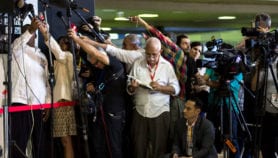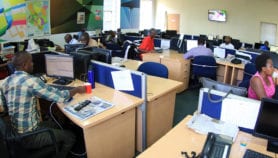22/04/21
Press ‘censored’ as COVID-19 pushes events online

By: Joel Adriano
Send to a friend
The details you provide on this page will not be used to send unsolicited email, and will not be sold to a 3rd party. See privacy policy.
[MANILA] For better or worse, the COVID-19 pandemic has forced actual live events to move online.
In theory, this should have made them more accessible to the media, and news coverage easier and cheaper, especially since it removes the considerable expenses on travel.
Unfortunately, the shift to online conferences, press briefings, and webinars has also made it easier for organisers to effectively control everything, making it an avenue for censorship. Questions are often filtered and those that are deemed critical or not to their liking are completely ignored.
In many instances, organisers will ask for advance questions from the media but will only select ones that suit their tastes. In fact, some of the selected questions are not exactly questions but statements of support or praise for the agency or expert’s hard work.
One Philippine government official who I talked to about this issue suggested that I had probably asked negative questions. But I assured him I had not. I merely ask tough questions that dig deeper into the topic.
For instance, in an event talking about support for start-up businesses, organisers ignored a question on how they can ensure that the programme will provide equal opportunities and diversity and not just benefit the usual privileged few. Such questions are not the usual what I call “grocery store” type questions of how many, how much, when will it be available, and the like.
A lot of events now have become one-way monologues, with rigid structures and little interaction. An editor who declined to be named shared her reporters’ complaints that online press conferences spent too much time on presentations, leaving little or no time for question and answer sessions. This way they not only filter the questions but also filter those who can ask them using the lack of time to entertain only one or two questions.
While this also happened in actual live events before, at least you had the chance to approach panellists, speakers and important guests and quiz them in person. Not anymore. More often they will just ask you to simply refer to their press releases and very rarely will anyone give you answers after the online event. Worse, they even completely leave you out of the invites for future online events if you raise issues or they deem you uncooperative.
In other ways, the shift to online has been generally good, making it easier for SciDev.Net journalists like Neena Bhandari to attend global events. But there is no substitute for meeting people in real life.
“Looking forward to when life returns to normal and we would be able to meet and brainstorm in person,” Bhandari says.
“I hope to see the live events soon”, agrees one Philippine-based journalist. “Besides, I miss the free-flowing coffee.”
This piece was produced by SciDev.Net’s Asia & Pacific desk.















